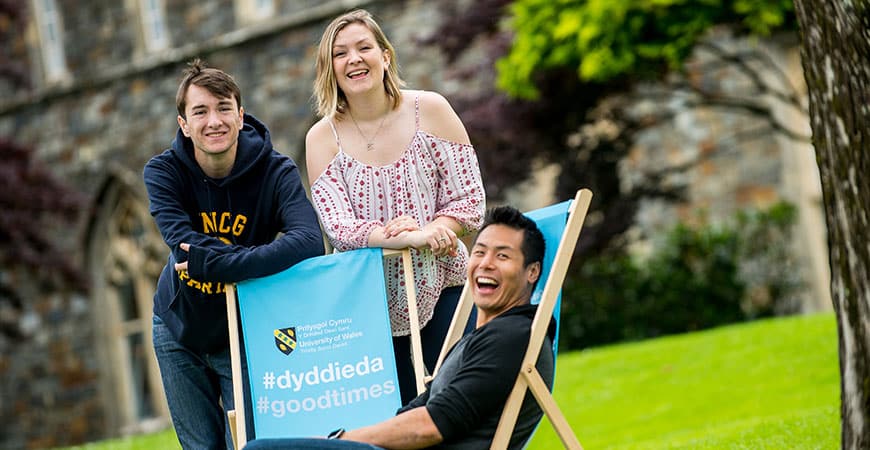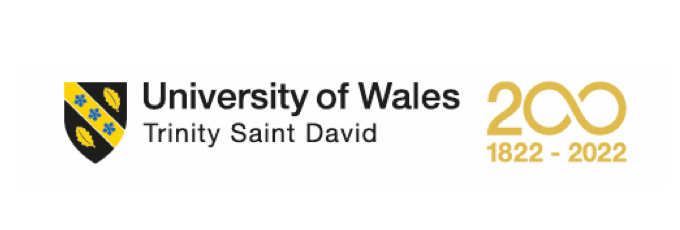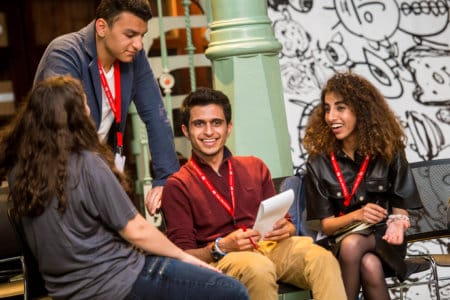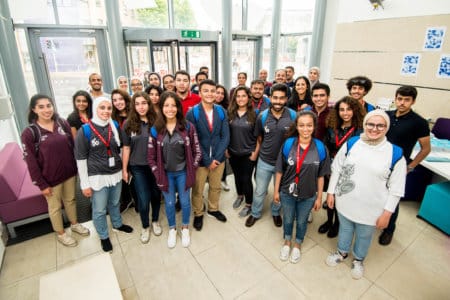Enlightening, challenging and fulfilling. That’s how Sian Owen would describe her experience at the University of Wales Trinity Saint David (UWTSD). The 66-year-old had meant to return to her studies at some point in life, but work and family commitments always got in the way. Now, the retired nurse had more time to pursue her interests — and reignite her passion for education along the way.
Of course, it was important for Sian to choose a programme that was meaningful to her and her heritage. Pursuing an MA in Interfaith Studies at the third-oldest university in England and Wales seemed the perfect option. This one-of-a-kind programme offers students the opportunity to learn more about specific religious faiths, as well as their relationships with each other.
Such unique programmes are a staple at UWTSD’s Centre of Humanities and Social Sciences. Here, programmes focus on cultural and religious traditions influencing and impacting the contemporary world. More than that, it offers students the rare chance to connect with their own religious and cultural history — learning more about who they are and where they come from in the process.
The MTh Christian Theology is a prime example. In this programme, students ask the big questions posed by the Christian tradition, from exploring the reasons behind our existence to considering how parts of the tradition work together. They do so by exploring everything from history and philosophy to hermeneutical theory and sociology. The MA in Biblical Interpretation is another. Taught by world experts in the field, this programme explores the literature of the Bible from a historical and cultural lens.

UWTSD has three main campuses in South West Wales – Carmarthen, Lampeter and Swansea ‒ as well as a campus in London. Source: University of Wales Trinity Saint David
For students of Irish, Scottish, or Welsh heritage looking to learn more about their own background and traditions, the MA in Celtic Studies focuses on various aspects of the history, literature and cultural heritage of the Celtic regions. Not many can claim to be part of a programme about their own homes, giving new meaning to the lands they grew up in, towns they inhabit, and more.
Classes are rich and insightful — and encourage conversations that revolve around everything. “I have really enjoyed modules led by Professor Jane Cartwright,” shares 52-year-old Celtic Studies student Samantha Richards. “She is a very engaged professor who has fabulous knowledge and is keen to share it with us. Her passion for her subject matter is infectious, and it was a delight to know that she would be my personal tutor and module lead on three of my four electives. I have enjoyed the Teams meetings where everyone has been able to contribute.”
At UWTSD, teaching is constantly evolving to ensure classes remain interesting and engaging. MA in Latin students dive deep into various forms of prose, poetry and epics. The MA Greek programme is similarly structured — taking students through the literary culture of Ancient Greece alongside their traditional language studies.
They’re taught by world-leading academics in their research areas, with an emphasis on research-led teaching and rigorous methodological approaches. In fact, 74% of UWTSD research has been judged as delivering outstanding and considerable impact on society, culture and industry.

Surveys show that 93% of UWTSD graduates were in employment and/or further study 15 months after completing their studies. Source: University of Wales Trinity Saint David
For John Cooper-Hammond, a Medieval Studies student, this was a huge draw. “I chose UWTSD as it was virtually the only university to offer medieval studies as a distinct discipline,” he shares. “My favourite module was the first one I attended — ‘Cistercian Studies’ with Professor Janet Burton. It was a topic of interest to me; well-structured and exceptionally taught.”
The MA Medieval Studies — and its MRes equivalent — approaches the medieval period from an interdisciplinary lens, including History, Literature, Theology, Celtic Studies and Archeology. Cooper-Hammond, as a former academic in the UK, Europe, West Africa and Pakistan, certainly appreciated this.
“I chose UWTSD as it was virtually the only university to offer medieval studies as a distinct discipline,” he says.
It was made all the more appealing by the fact that Medieval Studies — as well as all the other programmes listed above — are specifically designed and delivered for distance learning students. Like Owen, Cooper-Hammond is a mature student who balances other responsibilities, such as family and work.
Unlike most online or in-person master’s programmes, however, students can access material when it suits them, rather than being tied to a rigid class schedule. “My biggest challenges included balancing my professional and personal responsibilities,” says Syed Mohammad Haider, a student of MA Islamic Studies who hails from the US. “However, due to the flexibility of the programme, I could continue all of my academic endeavours without compromising on this.”
The fact that students are off-campus for the entirety of their degree doesn’t mean they do not gain support from their professors. “I have experienced multi-upsets due to my ADHD and its medicine, and this caused me to unravel and get in a panic for nine out of 10 assignments,” shares 51-year-old student Eileen Thornton. “Dr Caroline Lohmann-Hancock and Helen Davies of the Disabled Students’ Allowances centre kindly assisted me and made me feel at total ease.”
Since beginning her programme, Thornton has improved her skills in critical analysis, academic writing and proposing more balanced arguments. Haider has seen similar advances, alongside gaining confidence in his methodology to approach independent research. Most importantly, however, is the knowledge they’ve gained about their individual selves — where, arguably, the true value of further education lies.
Follow the University of Wales Trinity Saint David on Facebook, Twitter, Instagram, YouTube, LinkedIn













